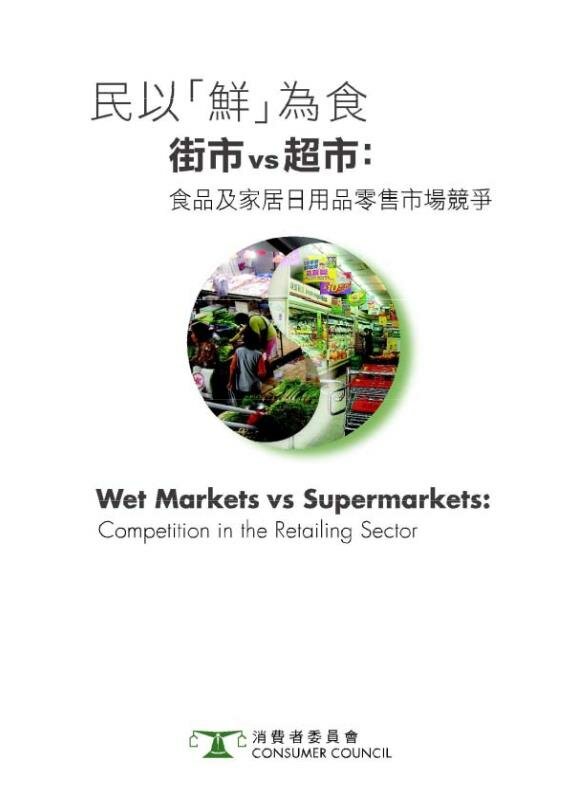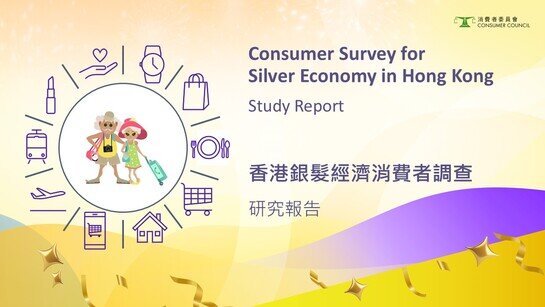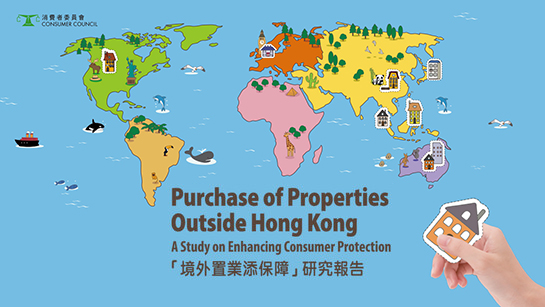
Hong Kong will benefit from a vibrant food retailing market with multiple operators and where competitive choices are available.
There is a strong case for government to take proactive action in order to minimize the economic impact of the gradual decline of wet markets through re-engineering the government's involvement in the wet market sector and retraining of the workforce.
Preface
- This Consumer Council study seeks to:
- examine the various areas in the foodstuffs and household necessities retailing sector, focussing on industry trends and development, government regulations, the state of competition in various markets, and allegations of unfair and anti-competitive conduct;
- raise questions for public debate on issues that the Council has identified as worthy of further discussion; and
- offer some practical suggestions as to how the issues that have arisen over the past few years can be appropriately addressed, as Hong Kong enters the first decade of the 21st century.
Industry Overview
- Since the Council released its first study into food retailing and distribution in 1994, with special reference to supermarkets, there have been a number of significant developments in the industry.
- The Council's analysis has revealed (amongst other things) that:
- Whilst wet markets currently have a significant share of the fresh food sector, there are indications of a gradual decline in consumer patronage due to a concern with the shopping environment, in terms of cleanliness and comfort that can be addressed.In the absence of appropriate measures there will be a difficulty for this sector to counter the increasing market share by supermarkets offering similar products and services.
- There is a prima facie concern with the market share held by the two largest supermarket chains in the packaged foodstuffs and household necessities sector.
i. In the six years from 1996 to 2001, there has been a substantial decline of small supermarketoperators by approximately 41%.
ii. From 1993 to 2003, the two major supermarket chains have grown 29% by number of retail outlets (31% for Wellcome and 28% for Park n Shop respectively).Having regard to a number of variables, such as the number of outlets and share of brand names (turnover), they can be considered at the threshold level of market concentration standards in guidelines issued by overseas competition authorities that warrant further attention should any mergers or acquisitions occur in the sector.
iii. Market share alone is not by itself indicative of market power. The conduct of market participants, particularly pricing behaviour, is also pertinent.The Council regularly performs pricing surveys of a basket of goods in supermarkets, and these have indicated that supermarket res showed that over these periods, there had been an increase of 3.6% in average ltail prices increased at certain time periods, despite the general downturn in the economy and the retail market. For example, the Council's price survey in 2002, covering five half-yearly periods from January 2000 to June 2002 indicated that there was an upward price trend at supermarket chains.The Council's analysiist prices of a selected basket of goods, and a relatively smaller 1.5% increase in prices for the same goods when the discount price was taken into account.In the most recent Council price survey for 2003, the average list prices of a selected basket of goods went up by 1.5% during the first half of 2003 compared with the same first half of 2002.Taking discount prices into account a slight decrease of 0.8% was recorded.One supermarket chain suggested that consumers might have benefited from the use of coupons and from multi-pack discounts.
iv. Notwithstanding the above pricing observations, it has been pleasing to note that during the recent SARS crisis when some traders exploited the early scarcity of protective masks by charging exorbitant prices, the major supermarket chains and other well established retailers acted as a stabilising force in the market for the public good.They achieved this by quickly meeting demand for the masks and offering them at prices substantially lower than the exploiting traders.This is to be commended.
v. Similar to the experience of other comparable advanced economies, complaints have also been levelled at major supermarket chains by other businesses.For example, there have been complaints that market power is being exerted over suppliers to the effect that:- existing competitors may be deterred from engaging in vigorous price competition, and which
- raises doubts as to the probable success of future new entry.
- Whilst wet markets currently have a significant share of the fresh food sector, there are indications of a gradual decline in consumer patronage due to a concern with the shopping environment, in terms of cleanliness and comfort that can be addressed.In the absence of appropriate measures there will be a difficulty for this sector to counter the increasing market share by supermarkets offering similar products and services.
- In correspondence with the Council, both supermarket chains denied exerting market power over suppliers.The Council is not a competition authority with powers of investigation and is therefore unable to establish the veracity of the allegations.Rather than having a competition authority with general oversight of the economy, the Government takes a sector specific approach to addressing complaints of anti-competitive behaviour.The relevant government bureaux and departments involved with administering policy with regard to the retailing of foodstuffs and household necessities would therefore have a role in examining the allegations. [1]
- Nevertheless, when these issues have been discussed between the Council and the relevant parts of Government, the response from Government suggests a view that because the complaints or allegations which emerge from time to time usually die down after a while, this may indicate a proper functioning of market forces that has sorted things out. However, a complainant may discontinue pursuing a complaint or dare not publicly come forward, due to other reasons.The Council suggests that an objective examination of complaints of anti-competitive conduct and the extent of control of the retail distribution network and its implications to small traders and suppliers needs to be undertaken by an authoritative body that:
- has the confidence of sector participants; and
- will pursue allegations to ascertain whether there are actually detriments to consumer welfare that are going unchecked.
- As indicated in Chapter 4 of the Council's report, the foodstuffs and household necessities retailing sector has been the subject of detailed examination by competition authorities in other countries which have examined similar allegations of misuse of market power and concerns with high levels of concentration in relevant markets.
Government Policy in the Retailing of Foodstuffs and Household Necessities
- Whilst there is limited government intervention in the foodstuffs and household necessities retailing sector, government bureaux and departments still exercise a role that has some influence.For example, through licensing various methods of food retailing, allocating land for commercial use, planning retail space for supermarket type retailing operations and wet markets in public housing estates, and in constructing facilities for and managing the operation of public wet markets.
Wet markets
- Apart from the fact that wet markets are an important competitive element in food retailing, w et markets can also be seen as an integral part of the cultural fabric of Hong Kong and one of the defining features that gives the city its unique character. Importantly, wet markets are also a large source of employment, not only for the actual wet market traders and their assistants, but the many goods and service providers who provide logistical and other support.
- Various surveys indicate that public and private wet markets enjoy considerable patronage, and substantial numbers of consumers indicate a preference for them.However, this preference is tempered by the concern over the shopping environment. Supermarket chains have taken the opportunity to develop wet market type facilities within their premises, recognising the preference that consumers have for wet market produce and the supermarket's ability to satisfy consumer demands for a comfortable shopping environment.Clearly, there is a need for wet market operators to recognise the necessity of improving the shopping environment in order for them to remain competitively viable.
- Nevertheless, due to the need to fully meet re-siting commitments, some markets managed by the Food and Environmental Hygiene Department (FEHD) have been over-provided with stalls. At the time of their construction there was no critical assessment of how many wet markets were actually required. Little regard was paid to competition posed by nearby markets; either in private developments or by supermarkets in the vicinity.
- As a result, there is most likely an oversupply of markets across the territory and clustering of a number of markets in the same location. This has also affected the occupancy rates and in some cases led to sub-standard stall sizes in some markets. In addition, most of the tenants, being former hawkers re-sited into the public markets managed by FEHD, have not been able to adapt to the enclosed market environment. They find it difficult to compete with the new format and style of business practices, such as tidiness and clear price labelling. Since they and their offspring have the right to operate their business in the public market in perpetuity and as they are only paying below market rent, this gives little incentive to enhance their competitiveness.
What Needs to be Done
- Hong Kong is becoming increasingly aware of the need to creatively manage the changes necessary to meet the economic challenges it now faces. One of those challenges is finding the appropriate way to address the disadvantage in the wet market sector as a competitor to supermarkets. If the sector was to contract by a large degree, whilst Hong Kong remains in the current economic "low tide", the consequential large-scale dislocation of the unskilled workforce will add to the current historically high unemployment rate.
- Questions therefore arise as to:
- whether a decline should be accepted as an inevitable consequence of changing consumer demands and the current operators' inability to match the resources of supermarkets; and hence it should be left to those small traders to struggle for their survival; or
- whether some measures should be taken to assist the traditional wet market sector to adapt to change and remain viable competitors, thereby reducing the dislocation that could occur and ensuring that a cultural characteristic of Hong Kong remains; albeit in a somewhat altered form.
- Needless to say, managing and facilitating the process of change is a better strategy than having to deal with unwanted and undesirable outcomes in the future. In a way, the evolutionary process of the food retailing sector today appears to be taking a similar course to the restructuring of Hong Kong's economy ten or more years ago; from a manufacturing-based to its current service-based economy. Many entrepreneurs have attained great success moving their manufacturing bases to the Mainland. However, the issue of retraining and employment of the dislocated low skilled labour force has emerged and remained the responsibility of the government.While dislocation of workforce as emerged from the study is not a consumer issue, the decline of the wet market industry will affect consumer interest in product choice, price and quality.Hence, the Council is obliged to point this out.
- The Council puts forward the view that there is a strong case for proactive action to be taken to minimize this dislocation through, where economically feasible, the re-engineering of the wet market sector and retraining of the workforce.
- Government could perform a facilitation role to help create a vibrant and competitive environment for market participants. The Government currently plays an important proactive role through investing in road construction and developing other infrastructure. For example, the preparation of land intended for residential and commercial developments, and for the airport and container terminals. In the same way, measures can be taken to provide a favourable environment, through pro-small business policy initiatives and other measures for market participants, in the foodstuffs and household necessities retailing sector.
- This is in line with the Government's vision as noted in the 2002 Budget speech where it was noted that:
"...economic activities in the local community closely linked to our daily life are also important. This local community economy covers a wide range of activity, including cultural, recreational, sports, social and personal services; and there are many different types of players, such as small traders, local domestic helpers and fitness instructors. Development of the local community economy can promote domestic consumption, create employment opportunities and highlight Hong Kong's unique characteristics".[2] - There are four areas of concern in the foodstuffs and household necessities retailing sector that the Council believes should be addressed.They are as follows:
- Improving the efficiency of the Hong Kong foodstuffs and household necessities retailing sector.
- Ensuring diversity, whilst maintaining traditional strengths, in fresh produce retailing.
- Maintaining a level playing field, responsive to the needs of all competitors.
- Ensuring that consumers can have trust in the market place
- The Council's recommendations in this regard are addressed below. It is to be emphasized that the Council is not calling for direct subsidy; nor is it advocating direct government intervention in markets, beyond what Government is currently doing.Neither does the Council intend to penalize success in the supermarket sector. The Council is advocating for an environment that ensures a vibrant marketplace and a win-win situation for business and consumers alike.
QUESTION 1. WHAT ARE THE BEST MEANS TO IMPROVE EFFICIENCY IN THE FOODSTUFFS AND HOUSEHOLD NECESSITIES RETAILING SECTOR?
- There is a disparity in resources and expertise available between large retailing chains and small traders insofar as their means to improve efficiency. While supermarkets appear to be readily adapting to the challenges ahead for the sector, the same cannot be said for small to medium enterprises such as wet market traders.
- There is a trend in advanced economies to target assistance to small and medium enterprises (SMEs) rather than leaving them entirely to their own devices when faced with substantial market power held by other larger competitors. For example, the Australian government has issued a report regarding assistance to be given to SMEs in the agricultural sector Securing the Future of Australian Agriculture [3] and the Australian Competition and Consumer Commission (ACCC) assists SMEs in a number of ways, such as developing their collective bargaining skills and providing assistance when SMEs are subjected to unconscionable conduct in business transactions. [4] The United Kingdom (UK) also issued in January 2003 a report Competitive Analysis of the Retail Sector in the UK where it is suggested that government should investigate how best to enhance the skill set of smaller retailers in terms of the supply chain and other practices. [5]
- Further, in other large metropolitan economies, such as New York and Boston, the city governments have schemes to revitalize commercial streets by stimulating private investment, reducing vacancies, improving the commercial environment and increasing profits for local businesses. Some years ago, the Boston municipal government saw the need to reform the small business sector and appointed a specific task force to come up with a plan to revitalise the sector, and funding and technical assistance to help small operators. [6] To improve its city image, the Shanghai government helped car cleaners in setting up a co-operative.After having gone through training, a modernized workforce emerged and major streets were rid off the untidy scene created by an untrained and disorderly workforce. Under a project dating as far back as 1979, the Taipei City Government has been modernizing the Nanmen market, a 105-year-old traditional wet market. Today the place is seen as a clean shopping emporium with new facilities and a modern style of management. The booths are orderly and have standardized signboards, and the entire market utilizes a reliable food refrigeration system. After the improvements were made, Nanmen vendors saw their sales increase. In 1998, Taiwan's Ministry of Economic Affairs launched a five-year program to upgrade the traditional food and vegetable markets and solve the problem of illegal markets throughout Taiwan. The Nanmen market serves as a model for the island wide modernization campaign. [7]
- The Council is of the view that some specific targeted assistance could be given to revitalize the wet market sector into an efficient and innovative industry, given the desire by consumers for competitive choices and the level of employment that these small enterprises bring to Hong Kong. [8]
- The Council is pleased to note that FEHD is providing training to wet market operators.The purpose of the training is to improve the customer service aspect of market stall lessees' interaction with their customers, and to sharpen their awareness as to the importance of food safety and environmental hygiene in a market setting. In addition to this, the Government's Small and Medium Enterprise Office (SMEO) under the Trade and Industry Department and the Trade Development Council have both developed commendable business promotion and training activities for SMEs. The Council believes these initiatives, and efforts of other institutions, can be utilised to assist in improving the competitive position of participants in the foodstuffs and household necessities retailing sector. For example, by promoting the utilisation of state of the art management information systems.
- The Council recommends that the SMEO or other relevant institutes develop specific programmes aimed at assisting small traders in the foodstuffs and household necessities retailing sector.
- Wet market operators should be alerted to the threat to their continued survival and their responsibility to understand the need to make a paradigm shift in the way they operate. For example,
- a "wet" market for fresh produce need not always be so wet as to irritate and deter consumers from patronising the area;
- operators must upgrade their knowledge and skills on technology that can provide efficient business solutions for supply side management;
- identify what service levels are necessary to improve competitiveness, such as issuing receipts and longer opening hours, in order to increase the customer base.
QUESTION 2. HOW TO ENSURE DIVERSITY WHILST MAINTAINING TRADITIONAL STRENGTHS IN FRESH PRODUCE RETAILING? GOVERNMENT'S FACILITATION ROLE?
- Hong Kong will benefit from a vibrant food retailing market with multiple operators, where competitive choices will be available. A rethink of government policy is warranted at this critical point.
- The Housing Authority (HA) and FEHD are both involved in maintaining the traditional role that wet markets have in serving Hong Kong consumers with fresh produce. A major reason for their involvement is to serve the public desire for buying fresh market produce.In the case of FEHD, wet markets serve to house those persons holding a hawker's licence. The sector is characterised by many individual operators who cannot afford to rent private shop premises.They rely on government to ensure that there is the necessary infrastructure and availability of low cost market facilities for them to continue to offer a service.In effect, both government departments have for some time taken on a role as major developers, or entrepreneurs for the maintenance of the wet market sector.
- The fact that government has historically played a role in maintaining wet markets, and continues to allocate government expenditure in maintaining related assets, means that from a public policy point of view it has a justifiable role in addressing the questions now being posed. Moreover, because the wet market assets are publicly owned, the Council believes it is incumbent on the Government to ensure that:
- the decline of the wet market sector (if it is accepted to be inevitable) is managed in an orderly fashion; or
- if it is agreed that wet markets are important and should be preserved in some way, that the evolution is efficiently managed.
- There should be a change in focus which goes beyond the mere provision of low cost space for stalls, because successful food retailing now calls for upmarket promotion strategies, cost efficient sourcing of products, and a strong emphasis on customer service.Information available to the Council indicates that HA and FEHD have devoted efforts in devising new strategies for wet markets and recognize the need for, and are planning to improve and upgrade facilities for their wet markets so as to maintain the commercial prospects for these developments.
- The Council recognizes that the situation is different between HA and FEHD.Whereas the relationship between the small store operators and HA is that of lessee and landlord, FEHD carries with its market the legacy of re-housing unlicenced hawkers. Changes in these markets will have implications of tenure. The move to revitalize business need the support and ownership of the store operators.
- The Council believes that Government should employ the creativity and entrepreneurial skills found in the private sector to manage the current markets, for this purpose.
- The Council notes the proposal by HA announced in July 2003 to sell its shopping malls (which include wet market facilities) and car park assets.The HA's stated intention behind its proposal is to divest the assets in the interests of realising the monetary value in those assets. The Council sees this as a good opportunity to ensure that the assets are used in such a way that their current important role in providing competition to supermarket chains is maintained and developed in a way that ensures continued strong competitive pressure on supermarkets into the future.
- Prior to the announcement by HA, the Council had formulated the following options in mind:
Option one: unencumbered sale of government owned assets
- The publicly owned wet market assets of FEHD and HA (including its other non wet market commercial properties) [9], could be sold on the open market and their use left to the new owners as they see fit. A modification would be to grant a lease with eventual transfer of ownership upon satisfactory demonstration of leadership within the trial period.
- This is similar to HA's current arrangement of granting a lease to a single operator. The difference lies in ownership; as once the market is in the hands of a commercially oriented owner, the owner will assume full responsibility towards the decoration, maintenance and management of the market; and make appropriate investments.
Option two: establish wet market co-operatives
- The individual retail areas of wet market complexes owned and operated by FEHD and HA could be sold to wet market traders.As owners of their units (with the Government remaining as the owner of the common areas) they could operate the wet market complex as a co-operative under a Deed of Mutual Covenant. The merit is the total involvement of the stall operators who would try their best to succeed.In so doing, the workforce will also be retained.
Option three: creation of wet market development corporation
- A statutory corporation could be created to act as an incubator for the continued development of the traditional wet market in Hong Kong. [10] The statutory responsibility of the entity would be to develop wet markets into a new type of shopping experience that uses the strengths of wet markets, i.e. freshness, multiple choices in fresh produce, as a basis for successfully evolving this mode of shopping into a form suited to meet current and future consumer aspirations.The corporation could:
- have a statutory term of reference to ensure the continuation of traditional wet market shopping, and manage its evolution to meet the current and future aspirations of Hong Kong consumers and society;
- have as its asset base current wet market and commercial properties infrastructure owned by FEHD and HA;
- utilise existing staff resources of both departments [11] that are currently deployed for management of commercial activities; and
- be privatised at a future date.
- The above options are raised to stimulate public discussion on the pros and cons of the options and is by no means exhaustive. As discussed earlier, there is a need for a paradigm shift by wet market operators as well as the government's policy objectives.The Government may consider running a pilot project for one or two of the above options, or to have the pilot projects co-exist in parallel. Experiences gained will point to the way forward.
- An important point is that the operators of the large supermarket chains must not be awarded the tender for these markets or involved in managing the evolution; otherwise it would defeat the objective of increasing the diversity in fresh food retailing.
QUESTION 3. HOW TO MAINTAIN A LEVEL PLAYING FIELD?
- The Council has received complaints from various parties concerned with alleged anti-competitive conduct in the supermarket sector. It has exchanged correspondence and held meetings with related parties in attempts to establish the veracity of the allegations. The allegations have ranged from attempts to induce resale price maintenance, and refusals to supply.Not being an investigative body with powers to obtain information, the Council can only conclude at best that there is anecdotal evidence to indicate that pressure has been exerted on suppliers to discipline competitors that threaten a preferred level of price competition in the market. Such conduct has been considered, in the Government's Statement on Competition Policy , to be a category of anti-competitive practice that may warrant further examination. [12]
- If Hong Kong had a competition authority that had investigative powers, similar to those existing in other comparable advanced economies, the authority could activate its information collecting powers, where the necessary prima facie evidence and therefore "reason to believe" or "reason to suspect" has emerged.
- In these circumstances, the authority would be in a better position to obtain information that could establish the veracity of the allegations on refusal to supply, or inducement of resale price maintenance, one way or the other, to a higher standard of proof.In the absence of such an authority, and its regulated information gathering powers, the industry will continue to be subject to innuendo and uninformed opinion, as far as allegations of anti-competitive conduct is concerned.
Self regulatory complaints mechanism
- The Government has indicated in its Statement on Competition Policy a support for industry self regulation as one means to "preserve and enhance free competition". The Hong Kong General Chamber of Commerce (HKGCC) in its Statement on Competition urges its members to "refrain from restrictive practices, such as collusive or predatory behaviour that impair economic efficiency or free trade" and encourages specific industries, where possible, to develop through their respective associations, a complaints-handling procedure as well as provisions to deal with non-compliance of their members. [13]
- Therefore, an option for the industry, or for the HKGCC to consider, is to develop a self regulatory complaints handling body that has the authority to examine allegations of anti-competitive conduct in the foodstuffs and household necessities retailing sector.
- Alternatively, supermarket operators, being good corporate citizens may consider expanding their current good conduct code, which is principally directed towards customer relations, to include other dimensions, e.g. relationships with suppliers etc. With transparent rules on good practice, the operators would be in a better position to answer what they consider to be unfounded allegations about their conduct.
- The Council is in the process of creating a Consumer Protection and Competition Model Code . The Model Code will comprise "Competition Rules" and "Rules on Structure of a Complaints Handling Committee and Procedure for Assessing Complaints Alleging Anti-competitive Conduct". The Council considers these might serve an appropriate basis for developing such a self regulatory scheme.The Council is happy to offer its assistance in this regard.
- The Council's preferred option for assessing allegations of anti-competitive conduct is the creation of a general competition law that applies to all economic sectors, similar to that existing in other advanced economies.The above self regulatory mechanism is suggested pursuant to the Government's preferred option as outlined in its Statement on Competition Policy , and the realisation by the Council that the Government's current position is not to introduce a general competition law.
- As a long term solution, the Council is in favour of introducing a competition law framework in Hong Kong; similar to that which exists in other comparable advanced economies. A general competition law would establish legislative boundaries, within "black letter law", as to what standard of behaviour is expected in relation to the range of conduct complained of. Under a competition law framework, with transparent rules and procedures, the various protagonists would be in a position to clarify their concerns, and defences, and there would be public debate on issues such as whether market power actually exists.
- Moreover, given the increasing concentration of market participants in the supermarket sector, it is reasonable to expect that some government assessment should be made as to what safeguards should be in place to prevent further concentration; particularly if either of the two largest supermarkets should merge.In fact, as noted in Chapter 3, the Government is introducing competition law safeguards to prevent anticompetitive mergers in the telecommunications sector (in the face of telecommunications industry concerns that they are being unfairly targeted). Therefore, from a government competition policy point of view, there is no apparent reason why similar safeguards could not also be put into place for the foodstuffs and household necessities retailing sector. Introducing a general competition law framework would address both the competition safeguard concern and the need for the rules to apply fairly to all in the economy.
- Problems also arise with regard to allegations of anticompetitive conduct.In the absence of a general framework for examining such practices, it is those with market power who will decide whether and how anti-competitive practices exist in the marketplace.In these circumstances, the disputes that arise between suppliers and purchasers, and competitors, will invariably be settled through withdrawal from the market or the weaker party succumbing to the demands of the dominant market player. The reason being that it is in neither party's interests to prolong a dispute and disrupt supply.Because the peace is negotiated in private, the public interest is not represented.
QUESTION 4. HOW TO ENSURE CONSUMER TRUST IN THE MARKET PLACE?
- Consumers suffer if misleading claims and trade malpractices exist in the market place.If the marketing environment is characterised by rivals engaging in misleading conduct, then healthy competition in the market will not exist.
- It is apparent from reported allegations of frozen pork being passed off as fresh pork [14] that there is a problem with misleading practices in the market place and these practices must be curbed.The Council notes the precautionary measures taken by FEHD in respect of the labelling of imported chilled chicken that will assist consumers to differentiate chilled chicken from fresh chicken. Such proactive measures are to be commended. The Council trusts that continual enforcement of appropriate laws and regulations will curb the problem of misleading conduct in the marketplace.
- The Government's efforts are also being complemented by industry. For example, a wholesaler accredits a retailer that sells fresh meat on the condition that the retailer observes the wholesaler's standard which is aimed at protecting its corporate goodwill. The Council supports these industry measures as a means of enhancing consumer confidence, and encourages more wholesalers to operate on a similar basis, to ensure that competition can play its part in maintaining high standards of marketplace behaviour.
Concluding Remarks
- In this study the Council has examined the dynamics that exists in the foodstuffs and household necessities retailing sector and pointed to the gradual decline of the wet market sector. The Council does not intend that success should be penalized in the supermarket sector, rather the Council is putting forward a case that Hong Kong will benefit from a vibrant food retailing market with multiple operators where competitive choices will be available, and a win ?win situation can be attained for all.
- The Council has identified the need for a paradigm shift by wet market operators.It supports government policy makers to adopt new policy objectives and strategies for wet market development, and where financially feasible, the re-engineering of wet market operation and retraining of the workforce. While dislocation of workforce as emerged from the study is not a consumer issue, the decline of the wet market industry will affect consumer interest in product choice, price and quality.
- We have put forward recommendations and options on these and other issues with a view to stimulating public debate. The Council is not saying these are a panacea for all the problems.Nor is it saying that they are the only options. What the Council is emphasising is that something must be done now if Hong Kong is truly concerned with competition within this sector; with the need to contain our unemployment problem; and in maintaining Hong Kong's competitiveness and truly unique characteristic as Asia's World City.
[1] For example, the Government's Competition Policy Advisory Group Annual Report of 2000 ?2001 notes in regard to complaints of anti-competitive conduct that "As a general rule, investigations into and follow up actions on the complaints are carried out by the relevant bureaux and departments." Seewww.compag.gov.hk。
[2] Budget Speech March 2002, paragraph 31.
[3] The report can be downloaded from website http://www.ncc.gov.au/pdf/CIComAg-001.
[4] See Section 51AC of the Australian Trade Practices Act 1974 ?Unconscionable conduct in business transactions, and the ACCC's Small Business Program. See http://www.accc.gov.au.
[5] The report, issued in January 2003, can be downloaded from website http://www.dti.gov.uk/retail/index.htm.
[6] In 1995, Mayor Thomas M. Menino created Boston Main Streets, the first urban, multi-district Main Streets program that provides funding and technical assistance to 21 neighbourhood-based Main Streets districts throughout the City of Boston. The program focuses its effort on providing merchants and community residents with the tools for their historic commercial districts to compete in today's market. The Main Streets program helps the local districts capitalize on their unique cultural and historical assets while focusing on the community's economic development needs. Examples include small business recruitment, business retention and addressing competition from shopping malls and discount retailers.
[7] See website: http://www.taiwanheadlines.gov.tw/20000418/20000418fl.htm.
[8] Asia Pacific Economic Cooperation every year has Small and Medium Enterprise Ministerial Meetings on policy development towards small enterprises, discuss the suggestions from the SME Working Group. It also creates APEC SME Network of Networks to facilitate information exchange for SME in the region.
[9] The Council recognises that FEHD assets would most likely encounter legal encumbrance problems.
[10] For example, an analogy can be drawn with the proactive policy that government has taken in the information technology sector where it is using private sector initiatives through a statutory corporation, the Hong Kong Science and Technology Parks Corporation, in its attempt to develop the Hong Kong economy into an IT hub.
[11] FEHD and Housing Department (HD).As recommended by the Review of Institutional Framework for Public Housing Report, the former Housing Bureau and the former HD merged on 1 July 2002 to form the new HD. The re-constituted HD continues to provide executive support to HA.
[12] See sub section 7(c) of the Statement on Competition Policy at www.compag.gov.hk which lists "conditioning the supply of specified products…to the acceptance of certain restrictions other than to achieve assurance of quality, safety, adequate service or other justified purposes".
[13] See Hong Kong General Chamber of Commerce website http://www.chamber.org.hk Chamber Statement on Competition Clause 6.
[14] In 2002, the Council received a complaint by the meat and livestock importer Ng Fong Hong (NFH) alleging misleading sales practices in relation to wet market traders and supermarket operators selling chilled pork as fresh pork. According to NFH, "chilled" pork from Thailand had been mixed together with fresh pork and sold to consumers as fresh pork. NFH stated that this had occurred in many wet market stalls, as well as in at least one supermarket.











